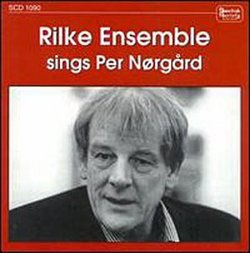| All Artists: Norgard, Rilke Ens, Eriksson, Nielsen Title: Rilke Ensemble Sings Per Norgard Songs Members Wishing: 1 Total Copies: 0 Label: Swedish Society Release Date: 1/2/2001 Genres: Dance & Electronic, Folk, Pop, Classical Styles: Vocal Pop, Opera & Classical Vocal, Chamber Music, Historical Periods, Modern, 20th, & 21st Century Number of Discs: 1 SwapaCD Credits: 1 UPCs: 739200109021, 7392004410903 |
Search - Norgard, Rilke Ens, Eriksson :: Rilke Ensemble Sings Per Norgard Songs
 | Norgard, Rilke Ens, Eriksson Rilke Ensemble Sings Per Norgard Songs Genres: Dance & Electronic, Folk, Pop, Classical
|
Larger Image |
CD Details |
CD ReviewsA frankly disappointing programme of pieces already represen Christopher Culver | 12/02/2008 (2 out of 5 stars) "This Swedish Society disc sadly came as a disappointment. The Rilke Ensemble cond. Gunnar Eriksson sings various works for chorus by Per Norgard, with occasionally the Goteborgs musikhogskolas slagverksensemble providing percussion. For some strange reason, the disc contains Norgard's String Quartet No. 3 "Three Miniatures" as well, though you'd be better off hearing that on the collection of Norgard's first six quartets on Kontrapunkt.
The first half of the disc consists of some of Norgard's most lightweight choral pieces, which won't impress the listener much at all. Worse yet, it turns out that all the texts on the disc are sung in Swedish translation instead of the Danish originals (with the exception of the Walt Whitman setting "Freedom", which remains in English). Come on, the unwillingness of the Swedish market to accept Danish literary material when it's basically the same language is ridiculous. The translation in many cases involved altering the choral writing, and so it wasn't a harmless process. "Drommesange" for chorus and percussion (1983) is one of Norgard's finest works, a tour de force setting of three stanzas by Finn Methling describing the same situation as an idyll, a catastrophe, and the uneasy border between. All of the musical material is based on a two tone infinity series, and the composer varies the rhythm by leaving out certain notes to match the change in the poem's mood. Unfortunately, here the piece completely fails in the performance here. Eriksson leads what should be a very bold piece in a lethargic fashion. The use of percussion is sparing--granted, the piece is scored for percussion ad lib., but the published score gives three percussion parts, and these work very well. Here it sounds like there's only one percussionist. I would recommend coming to know this piece instead from a Dacapo disc. That same Dacapo disc offers a better performance of "Maya Dances" (1979), a short extract of music from Norgard's opera "Siddharta", where all music is based on the lush diatonic infinity series which beautifully undulating golden section rhythms (indeed, notice how the piece is divided into the golden section not only bar to bar, but as a whole). And that same Dacapo disc also has much, much better performances of the 2 Wolfli Songs, the mournful "Abendlied" for mixed choir and the absolutely zany "Halleluja, der Herr ist verrueckt" for chorus and percussion. If you've come across the listing for such an obscure disc, I'm going to assume you know Norgard's music enough to be familiar with "Wie ein Kind", the first piece of his schizoid Wolfli period. This disc contains "Wiigenlied", its first movement. Now, the Rilke Ensemble have done much to make "Wie ein Kind" one of the most frequently performed and widely loved works in the Nordic countries, but I'm going to stick with the Danish National Radio Choir performance on a Chandos disc. The disc wasn't a complete loss for me, as it has the only easily available recording of "ZigZag" for six percussionists (1981), closely related to his earlier percussion sexet "Square and Round" and often programmed after it in concert. The music material "ZigZag" is an exceedingly simple application of the two-tone infinity series, and if you know Norgard's "Easy Beats" for amateur percussionists, you'll recognize motifs here. I can recommend this disc only to Norgard completists." |

 Track Listings (17) - Disc #1
Track Listings (17) - Disc #1